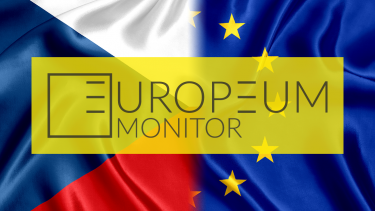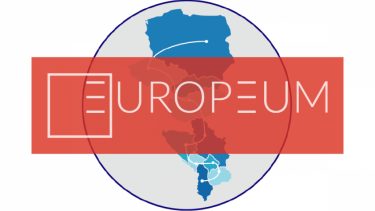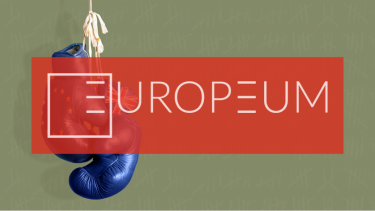INVITATION: Reconciliation in Visegrad and the Western Balkans: Overcoming the Past Together
We would like to cordially invite you to an event organized by the EUROPEUM Institute for European Policy and partners in the project “From Warsaw to Tirana: Overcoming the past together”, supported by the International Visegrad Fund.
Show more PDF
EU MONITOR: Has the time come for a Czech Regional Policy?
Over the past 5 years, the Czech Republic has experienced unprecedented GDP growth, moving the country from 83% of EU average GDP in 2013 to 91% of the EU average GDP in 2019. At the same time, the Czech wage increased by more than 7% in 2013 in the last three years. This phenomenon is addressed by our Vít Havelka in the latest issue of the EU Monitor.
Show more PDF

INVITATION: Reconciliation in Visegrad and the Western Balkans: Overcoming the Past Together
We would like to cordially invite you to an event organized by the EUROPEUM Institute for European Policy and partners in the project “From Warsaw to Tirana: Overcoming the past together”, supported by the International Visegrad Fund. The event takes place on Monday, 20th of January 2020 from 3.45 PM in Hotel Leopold, Brussels (Rue du Luxembourg 35, 1050 Ixelles, Brussels).
Show more PDFINVITATION: Reconciliation in Visegrad and the Western Balkans: Overcoming the Past Together
We would like to cordially invite you to an event organized by the EUROPEUM Institute for European Policy and partners in the project “From Warsaw to Tirana: Overcoming the past together”, supported by the International Visegrad Fund. The event takes place onTuesday, 14th of January 2020 from 4.15 PM in European House (Jungmannova 24, Prague 1).
Show more PDF
Representation of the regions in the European Union: the V4 experience
Due to their close contact with citizens, regional and local authorities are usually the best informed on their needs. But is the voice of the regions and its citizens heard in Brussels? What options do the local governments have when pursuing their interests? And what is the situation like in V4 countries? Patrik Kováč answers these and many more questions in his policy paper as part of Think Visegrad Platform.
Show more PDFGood practices and lessons learned from the Visegrad Four and Western Balkans
EUROPEUM Institute for European Policy in association with Research Center of the Slovak Foreign Policy Association, Institute for Foreign Affairs and Trade, European Movement in Serbia, WiseEuropa Institute and Academy of European Integration and Negotiation published final Policy Paper about good practices and lessons learned from the Visegrad Four and Western Balkans.
Show more PDF

POLICY PAPER - Overcoming the legacies of the past together: Serbia and Hungary
Igor Novaković and Anna Orosz published Policy Paper about overcoming the legacies of the past together: Serbia and Hungary.
Show more PDF
POLICY PAPER - The ups and downs of Polish-German reconciliation and lessons for the Western Balkans
Adam Balcer and Klaus Ziemer published Policy Paper about the ups and downs of Polish-German reconciliation and lessons for the Western Balkans.
Show more PDF
Policy paper: Implications of Brexit in EUs Decision Making for the Czech Republic
What are the possible consequences of Brexit for the Czech Republic's position in the EU? What impact does Brexit have on the European political arena? And what steps could help our country to adapt to new status quo? These are some of the topics discussed in the policy paper prepared by our research fellow Vít Havelka.
Show more PDF
Support to independent reporting on Serbia’s EU integration process with focus on the Chapters 23 and 24
We are proud to conduct a project focused on support to independent Serbian journalists reporting on Serbia’s EU integration process and specifically the obstacles in the key Chapters 23 and 24 which is supported by the Ministry of Foreign Affairs of the Czech Republic.
Show moreStaroměstské náměstí 4/1
Prague 1 - Staré Město
110 00
tel.: +420 212 246 552
email: europeum@europeum.org
https://www.europeum.org








